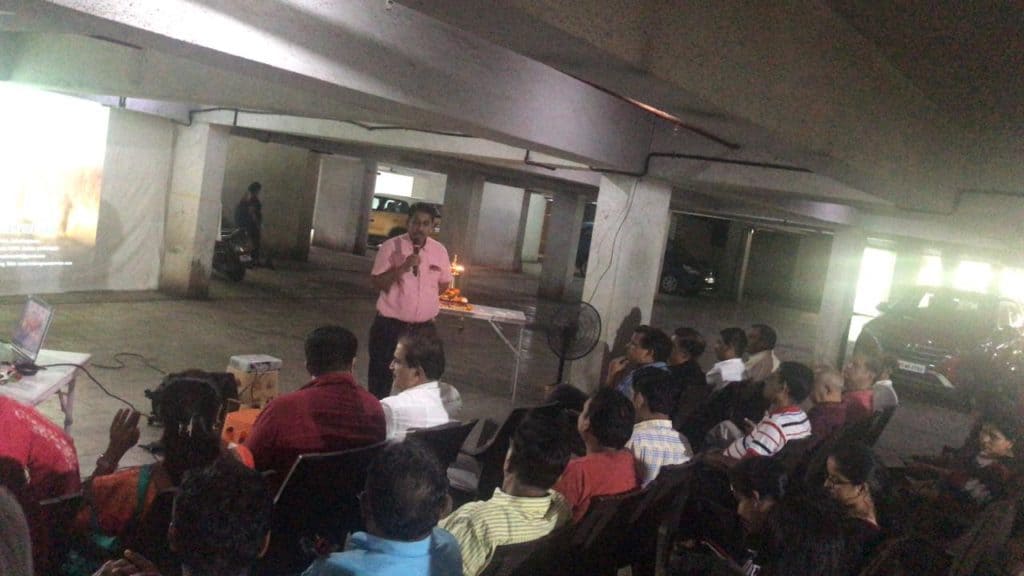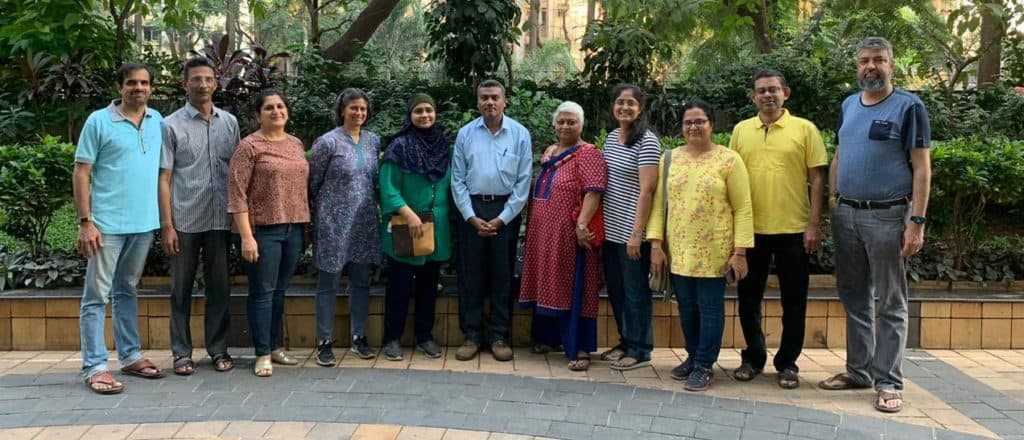Yesterday, I told you how I managed to learn solid waste management techniques from one of the pioneers in the industry.
The two-day training I attended with Mr Srinivasan, a relentless advocate of efficient waste management, helped our township walk down the path of implementing those techniques.
Mr Srinivasan is the Apex Monitoring Committee Special Invitee to National Green Tribunal (NGT), New Delhi and a resource person from Ministry of Housing and Urban Affairs, Government of India, that is implementing the Swachh Bharat Mission. On request, he made a visit to our Lokhandwala Township in Kandivali East in September 2019. The overall outlook was positive, so much so that members of the township got together to create a local SLRM Team to take the matter further. We committed to not send garbage out of the township. The team coordinated with the MCGM officers, the Corporator and the MLA to identify possible sites to set up SLRM centres.

The SLRM Organisng Team of Lokhandwala Township with Mr Srinivasan, December 2019
Without putting any financial burden on MCGM, the team got Mr Srinivasan back to Mumbai in December 2019. This visit was used to conduct a workshop explain the project to the residents of the township to get their support. The MCGM Asst Commissioner R South Ward Mr Sanjay Kurhade, local MLA Mr Atul Bhatkalkar, Corporator Surekha Patil and other concerned persons from MCGM, were also present and they could clarify their doubts with Mr Srinivasan. Inspection of possible sites to set up SLRM centres was also done. At the end of the 2-day visit, we had a plan ready to be presented to the ward office, and to those societies who could not participate in the workshop.

Lokhandwala Township SLRM plan
Our end objective was to make Lokhandwala Township, made up of about 10,000 flats and 500 commercial establishments, garbage free, roadside dustbin free and dumping site free.
Waste generated as on December 2019
- Household waste generated per day (approx)
- Organic (wet/kitchen) waste = 6,000 kg
- Inorganic (dry) waste = 1,500 kg
- Sanitary waste = 1,500 kg
- ~ 1 kg per household per day
- Organic kitchen waste handling
- Bulk generators – composted within premises or outsourced for composting
- Small generators – collected by MCGM
- Inorganic waste (paper, plastic, metal, glass, etc.) handling
- Sold by workers in each society / Collected by MCGM
- Sanitary waste handling
- Collected by MCGM
- In addition, other waste generated includes…
- Garden waste, E-waste, Medical waste (syringes, medicines, etc.), Sharps (broken glass, blades, etc.), Miscellaneous waste such as shoes, clothes, toys, furniture, etc.
- Specialised waste such as hair from barber shops, cut pieces from tailor shops, coconuts from tender coconut, etc.
Dealing with such massive amounts of waste would be tough but we decided that the solution should:
- Support proper and scientific disposal of waste
- Be simple to implement, not require high technology
- Utilise the labour force from the neighbourhood
- Add dignity to the work of waste management
- Be environmentally sustainable
- Be cost efficient and financially self-sustaining
We figured we should not spend money on waste, instead make money from it. And wanted to implement SLRM.
Where we stand today
- The identified locations were inspected by the MCGM engineer who was to give his inputs for the Asst Commissioner of R-South Ward to put forth a proposal to MCGM main office
- The SLRM Team met with the management of a couple of gowshalas where organic cattle-edible waste can be sent; further exploration and MCGM involvement is required
- Many societies in the township have come on board and have expressed their support to the project
What else we need to do
- Step 1 – Finalising the location, Setting up the Project Design (size of building, staff required, etc.), Government approvals and funding
- Step 2 – Finalising the infrastructure, Awareness generation and training, Piloting the model with limited number of societies
- Step 3 – Formal launch (pre-Covid, this was aimed for 5th June 2020 World Environment Day), Working on further expansion
What’s required from MCGM
- Finalisation of dedicated spaces which will house the SLRM centres
- Setting up a multi-storied building structure / repairing an existing building identified
- Hand-holding support for the first 6-12 months
- The MCGM needs to involve themselves whole-heartedly to make the project a success, recognising that this is primarily their project, supported by local residents
Advantages for societies
- No dependence on MCGM to collect the waste
- No need to hold on to any waste within the premises – SLRM centre will be an essential service working with no holidays
- Societies that have already invested in composting infrastructure and wish to continue, can opt to continue to do so
- Societies doing composting / hiring agencies for this purpose and wishing to discontinue will save on these expenses or incur reduced expenses
- All societies, including those currently exempted from managing organic waste themselves will have the satisfaction of knowing that their waste (including sanitary waste) is being treated properly and not ending up in landfills
- Property tax rebates are being given to societies for proper waste management, which can be extended to them through the SLRM model
Long term benefits
- Environmental protection – No waste will go out of the township to the landfills, the township will be clean, minimising disease and illness
- Job creation – 150-200 jobs will be generated at the SLRM centre, employing the youth, women and differently-abled people from the vicinity, thereby creating a meaningful engagement between residents, authorities and everyone who gets touched by this project
- Economic growth – The township will earn from its own waste
- This will be a replicable model for Mumbai
Back to square one
Our initiative is envisaged as a joint project of MCGM and residents of the township, and would be unique model as it would be the first known Multi-Storied SLRM centre in the world. It will eventually be a flagship project, both from an environmental as well as a social perspective.
After COVID-19 struck and lockdown was imposed, many of the bulk generators were unable to handle their organic waste as they had been doing earlier (like on-site composting). They have been handing this over to the MCGM garbage truck and the garbage is dumped in landfills. Recyclers have also not been able to collect the inorganic waste, so in their absence, MCGM has been collecting most of this waste from even bulk generators. Some societies have stopped segregating, and handing over mixed waste.
With no end in sight for COVID-19 as yet, and with the volume of waste mounting every day (especially biowaste such as face masks, gloves, PPEs and other disposables) it is high time that this SLRM waste management project is brought back on the radar.
Also, it is really worthwhile for MCGM to give this model more attention for the whole of Mumbai city. It is a long term sustainable solution that is zero polluting unlike waste-to-energy plants that have been proposed.
Written with inputs from the SLRM Team, Lokhandwala Township

Cannot agree more with you Arathi! In the last few months, post Covid19, there’s a huge number of disposable and medical waste, which is being generated and that’s a massive burden on our already strained systems. More reason that this initiative needs to kick off immediately.
I am very sure , under your leadership we will be able to make a core team and set our Lokhandwala Township Kandivali a pilot model for Mumbai and nation at large. At your service. Jay Hind. Shashi Kant. Marine Engineeer. A Veteran of Indian Navy